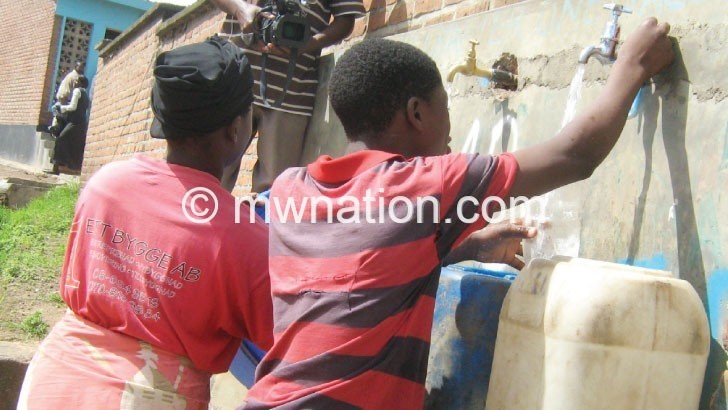K10bn water deal raises eyebrows
Procurement specialists have faulted the manner Southern Region Water Board (SRWB) has awarded a multi-billion kwacha contract to a firm that charged K1.6 billion more than the lowest evaluated bidder.
The evaluation report on the bids shows that the lowest bidder “passed” both preliminary examination and detailed technical evaluation, but could not be picked purportedly because the pricing showed lack of understanding of the “technicalities and complexities” of the project.

In June this year, SRWB advertised a tender for detailed designs and construction works for the extension of Mangochi Potable Water Supply Project funded by the Kuwait Fund for Arab Economic Development.
The evaluation report The Nation has seen shows that 14 companies bought the bid document, but only four submitted their proposals.
Jiangsu Suzhong Construction Group Company Limited made a bid of $16.3 million, Alghanim/Plem quoted $14.4 million, Sawa Group/Metito joint venture priced its bid at $21.7 million Kuwait Dynamic Limited/Fisd partnership offered $12.3 million.
In an interview yesterday, procurement specialist Amos Nyambo faulted the justification of the evaluation. He said at financial stage the evaluation should have considered financial-related matters and not technical issues.
He said: “If the bidder reaches financial stage it means they have done well on preliminary evaluation and technical/detailed examination.
“At technical level, issues of competence and experience are looked at. So, when you proceed to financial evaluation it means technically you are OK; hence, to raise technical issues at the financial stage is quite unusual.”
Nyambo, who is also board chairperson of the Malawi Institute of Procurement and Supply, said the evaluation would only look back at technical competence where more than one bidder offer the same price and made it to financial evaluation.
On whether the low rate would be subject of suspicion for lack of understanding on the project, he said this would only apply where the engineer had already determined the project cost.
Nyambo also wondered how a bidder would be deemed to have failed for lack of understanding on the complexities and technicalities of the contract when the bid documents required each one of them to produce a design of the project.
Another procurement specialist, who works in the public sector, said if the lowest bidder had no experience they should not have proceeded to the next stage.
The specialist, who refused to be named, said the evaluation report The Nation shared contradicted itself as it appraised all bidders as technically capable and yet disqualified the lowest one on technical excuses.
Said the specialist: “It is utterly suspicious because the lowest bidder has ever handled an ECP [Engineering Construction and Procurement] kind of contract so their experience cannot be faulted.”
Another procurement official made similar observations, saying: “Technical evaluation precedes financial evaluation, not vice-versa.”
Both the Public Procurement and Disposal of Assets Act and the bidding document for the tender in question indicated that preference would be given to “the lowest evaluated bidder”.
Evaluation procedure requires bidders to go through preliminary evaluation and successful ones proceed to technical and detailed assessment. Only successful bidders are subjected to the financial evaluation where they compete on pricing.
The evaluation report indicated that the four bidders successfully went through all levels of evaluation and reached the financial stage.
Reads the evaluation report: “The bidders listed are technically capable in all respects to perform fully the contract requirements and have the integrity and reliability to assure performance of the contract obligations. However, their offers are further subjected to financial evaluation.”
At financial evaluation stage, Sawa Group was disqualified for having the highest cost which left only three for consideration.
In the report, the evaluators acknowledged that Kuwait Dynamic Limited/Fisd quoted “noticeably lower prices for the items under the general requirements and preliminaries when compared to other bidders; hence, they fall lowest in this division with a difference of 21.42 percent lesser than the highest quoted amount in this division”.
Kuwait Dynamic Limited/Fisd also scored points for quoting considerably lower rates for the mechanical works, but, ironically, the low price became a ground for disqualification.
The report said Alghanim/Plem , which quoted K10.9 billion and K1.6 billion higher than Kuwait Dynamics/Fisd’s K9.3 billion, was awarded the contract.
Both Plem and Fisd are Malawian-owned businesses which partnered foreign firms. Fisd is owned by a group of indegenous Malawians with expertise in water and irrigation engineering while Plem ownership includes Malawians of Asian descent.
In an interview yesterday, SRWB chief executive officer James Chitete did not quite agree with The Nation findings, saying the evaluation team included those appointed by the financier; hence, no likelihood for manipulation of results.
He said the lowest bidder was disqualified at technical level for lack of experience in an ECP contract arrangement.
Ironically, Fisd had previously worked on a similar project for SRWB.
Chitete said the evaluation report was also shared with the Anti-Corruption Bureau, Government Contracting Unit, Ministry of Justice and the Office of the President and Cabinet.





